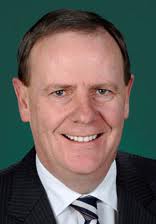With surpluses like these who needs deficits?
Posted by Andrew on Oct 28, 2012 in Economics and Finance | 0 comments
Some people have criticised the Howard and Costello years for their ‘reckless spending’. In fact the current treasurer may have used just those words. I would argue that whilst in the second half of their term spending may have been excessive, i.e. overly generous or even un-necessary it was not reckless. Excessive spending is spending spare cash inefficiently. Reckless spending rather, is spending money you don’t have on things you can’t afford. And for examples of reckless spending we need look no further than this year’s budget revisions, as former treasurer Peter Costello in the Sydney Morning Herald.
Wayne Swan originally announced the 2012-13 budget surplus on May 11, 2010. He has heralded it in each budget and midyear review since. Which makes Monday the sixth time he’s announced it. It’s a forecast surplus of $1.1 billion. Never before in the history of budgeting has so little been promised so often.
Back in 2010, I pointed out it would not be until September 30, 2013, when the final accounts were in, before we knew whether a surplus had been delivered, as opposed to just promised. That is after the next election when people will have lost interest in the 2013 year and, in all likelihood, Swan. The government is claiming there will be a surplus of 0.1 per cent of gross domestic product. If you think economic forecasting is reliable to this sort of accuracy, you haven’t been listening to recent developments.
The terms of trade have been much stronger than was anticipated back in 2010 so, if anything, things should have improved. But last year was a real shocker. Although we had above trend growth, the budget deficit was $43 billion. Part of the reason was the government prepaid a lot of expenses and pushed back some dividends. While it made last year much worse, it bolstered the bottom line this year (2012-13), which would now be showing a deficit except for a level of massaging and manipulation that even a contortionist could only marvel at.
In truth it matters little whether a budget is 0.1 per cent in deficit or 0.1 per cent in surplus. What matters is that over the medium term the government does not spend more than it raises. A budget deficit simply means that at a particular time, a society is prepared to enjoy more services than it is prepared to pay for. If at a later time it is prepared to pay for more than it spends on itself, then that surplus can pay off the deficit. What is not acceptable is if a society persistently takes benefits and passes the cost on to future generations by running up debt.
Australia suffered fallout from the 2008 collapse of Lehman Brothers and the associated financial crisis. You would expect the budget position to slip. Since then our terms of trade have soared to all-time record highs. You would expect things to recover.
Leave aside the year-by-year results, because they can be manipulated by “bring-forward” and “push-backs”, and focus on the medium term – the time frame for this government’s budget policy and the one set by its predecessor. Over four budgets from 2008, deficits have cumulated 12.8 per cent of gross domestic product. Taking this year and the following three budgets, this will be followed by cumulative surpluses of 0.8 per cent (provided the economy grows at trend). Four years of surplus will pay back 1/16th of the four years of deficit. At that rate it would take half a century before we get to the stated goal of “surplus on average”. That is not the medium term.
I am not setting up some impossible standard here. I am measuring the projections against the government’s own stated goals. And it shows how weak the present policy is.
Another of its goals is to “improve the government’s net financial worth over the medium term”. This measure includes government debt and its superannuation liabilities. Since it decided to set this goal, net financial worth has plummeted. You see, it is not just that the government has racked up debt. The Commonwealth does not even pay the full cost of its staff. It is not paying the superannuation component of public service entitlements. Nor does it count this as a cost in its budget. If a private employer tried to do this they would be prosecuted. It’s the kind of thing that drives the private sector wild. While the government is telling employers to lift superannuation contributions for staff, it is not funding its own superannuation schemes.
To get back to where net financial worth stood when this government was elected would take accumulated surpluses of about $240 billion or over 15 per cent of GDP. That puts a surplus of 0.1 per cent in perspective. There is a long way to go just to get back to where we were. Remember that Labor policy was to improve things “over the medium term”. I sometimes wonder if the senior members of the government know what their policy is, let alone understand it.
Image sourced: http://www.petercostello.com.au/





Recent Comments